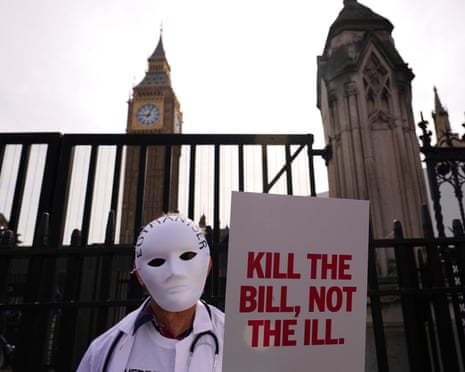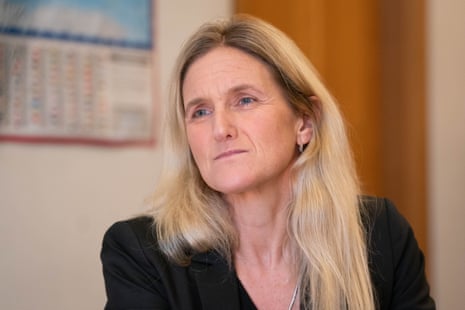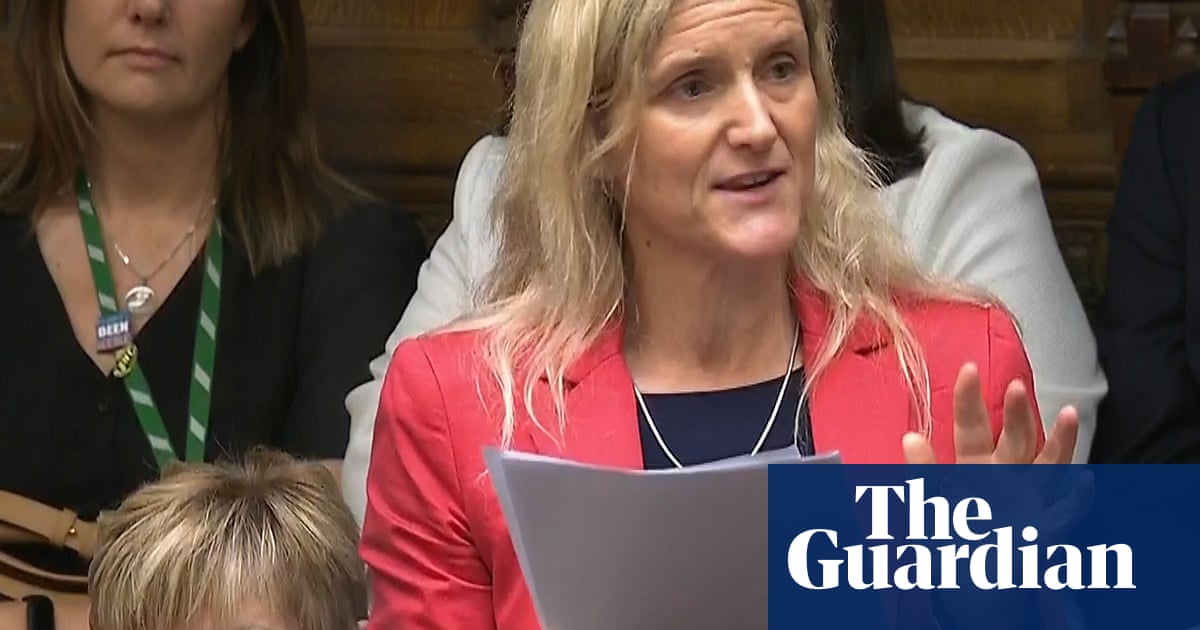MPs vote to reject amendment on 'being a burden'
MPs have voted to reject an amendment which would have prevented a person who is substantially motivated by feeling they are a burden, from qualifying for assisted dying.
Conservative MP Rebecca Paul’s new clause 16 stated that a wish to end one’s own life should not be substantially motivated by factors such as a mental disorder, disability or suicidal ideation.
The Commons voted 208 to 261, majority 53 against.
Key events Show key events only Please turn on JavaScript to use this feature
MPs agree ministers need new powers to broaden NHS's purposes
MPs have agreed that ministers should get powers to update the National Health Service Act 2006 as part of the assisted dying bill, to include voluntary assisted dying services as part of the NHS’s purposes.
Amid fears the bill could become “the Trojan horse that breaks the NHS”, aired last Friday, Labour MP Siobhain McDonagh pushed her amendment 12 to a vote, which would have blocked ministers from broadening the NHS’s purposes without a fresh bill.
But MPs rejected McDonagh’s proposal 269 votes to 223, majority 46.
MPs have divided to vote on amendement 77 to the assisted dying bill.
Amendment 77 would expand the provisions of the bill relating to the regulation of approved substances and a ban on advertising to cover the whole of the UK and extend other legal protections to England, Wales and Scotland.
MPs have now divided to vote on amendment 12 to the assisted dying bill. Amendment 12 would prevent section 1 of the National Health Service Act 2006, which sets out the purpose of the NHS, from being amended by regulations and so would need any changes to be made by an act of parliament.
MPs reject proposal concerning presumption of capacity
A proposal to disapply the presumption that a person has capacity unless the opposite is established in cases of assisted dying requests, has been rejected by MPs.
The Commons voted 213 to 266, majority 53 to reject amendment 24, which was tabled by Labour MP Daniel Francis (Bexleyheath and Crayford).
MPs support safeguard for those who voluntarily stop eating or drinking
MPs have supported a safeguard which would prevent a person meeting the requirements for an assisted death “solely as a result of voluntarily stopping eating or drinking”.
The terminally ill adults (end of life) bill’s sponsor Labour MP Kim Leadbeater had previously signalled her support for the amendment, which was tabled by Labour MP Naz Shah (Bradford West).
Leadbeater said this, combined with existing safeguards in the bill, would rule out people with anorexia falling into its scope. The amendment was passed on the nod.
MPs have now divided to vote on amendment 24 to the bill. Amendment 24 would remove the presumption that an individual applying under the act would have mental capacity under the Mental Capacity Act 2005 unless proven otherwise.
The result is expected at 10.05am.
Joe Coughlan
Here are some photos coming to us through the wires from outside parliament of campaigners appealing for or against assisted dying:




MPs vote to reject amendment on 'being a burden'
MPs have voted to reject an amendment which would have prevented a person who is substantially motivated by feeling they are a burden, from qualifying for assisted dying.
Conservative MP Rebecca Paul’s new clause 16 stated that a wish to end one’s own life should not be substantially motivated by factors such as a mental disorder, disability or suicidal ideation.
The Commons voted 208 to 261, majority 53 against.
Assisted dying bill debate begins in House of Commons
MPs have gathered in the House of Commons for the third reading of the assisted dying bill. If approved, it will then go to the House of Lords.
There will also be four votes in the Commons on changes within the bill since it was last put to MPs in November.
MPs have now divided to vote on new clause 16 to the terminally ill adults (end of life) bill. We will bring updates from the debate today as it progresses.
New clause 16 would add a list of factors, such as not wishing to be a burden on others or a disability, that would mean a person wishing to end their life would not qualify for assistance under the law if that was their substantial motivation.
St Christopher’s hospice have shared a statement ahead of the assisted dying bill’s third reading and vote in the House of Commons.
Jan Noble, interim chief executive of St Christopher’s said:
The terminally ill adults (end of life) bill has huge implications for hospices, our staff, volunteers and patients, as well as the health system and society more broadly. But there are still many unanswered questions around how a future assisted dying service would work.
Given this lack of clarity we welcome the introduction of new clause 20, which would require the government to consult with palliative and end of life care providers if the bill progresses. It is vital that the access of palliative and end of life care for everyone is increased, and for that we need a better funding model for hospices.
In line with this, we encourage MPs to vote for amendment 21 which would require an assessment of the availability, quality and distribution of palliative and end of life care.
St Christopher’s remains neutral on any change in the law and our absolute priority continues to be making sure that everyone who needs it can access equitable palliative care and support, wherever they are and whenever that may be.

Libby Brooks
The Scottish government aims to make £1bn of savings with a public service reform strategy that aims to reduce the spend of public bodies by 20% over the next five years.
Ivan McKee told BBC Radio Scotland this morning was looking “across the gamut” of 131 public bodies and 51 directorates for savings, and reduction of duplication.
While McKee refused to specify how many redundancies were likely he said there was wide agreement that government needed more integration and joined up services, more digital technology and more investment in prevention, but pointed out that core government departments had successfully reduced head count by not hiring people to replace those who had left.
But the Scottish Trades Union Congress (STUC) criticised the strategy as “missing the mark”, describing the strategy as cuts packaged as reform, while Scottish Labour dismissed the strategy as “a plan for a plan”.
Daniel Johnson, Scottish Labour’s finance spokesperson, added:
Reform, to my mind, is not about shrinking the state, but maximising its effectiveness and you cannot ignore the fact that over the past decade, the civil service has grown at three times the rate of the NHS, while police, fire and colleges’ headcounts have all fallen.
The Guardian’s social affairs correspondent, Jessica Murray, spoke to supporters and opponents of the assisted dying bill on their hopes and fears ahead of Friday’s crucial vote. You can read the piece here:
UK ‘behind curve’ on assisted dying among progressive nations, says Kim Leadbeater
The UK is “behind the curve” among progressive nations, the assisted dying bill’s sponsor, Kim Leadbeater, has said on the eve of one of the most consequential votes for social change in England and Wales.
The Labour MP said the circumstances may never be right again to pass such a bill, which would legalise assisted dying in England and Wales for terminally ill people with less than six months to live, subject to approval by two doctors and a panel of experts.
Her intervention came amid more warnings about the safeguards in the bill, including from the Royal College of Psychiatrists and disability activists, who will protest outside parliament on Friday at the final vote in the Commons.
Opponents believe the bill will not offer sufficient protection to those with mental illness or disability or those who might be coerced by abusers. On Thursday, another leading Labour MP, Dan Carden, said he would vote against the bill and the Conservative leader, Kemi Badenoch, urged her MPs to oppose it.
Keir Starmer has reiterated his own support for the bill, but on Thursday night there was no firm commitment from No 10 that the prime minister would be present to vote.
“We are behind the curve,” Leadbeater said. “We’ve got the law going through the Isle of Man. We’ve got Jersey. We’ve got France. We’ve got various American states, Colorado recently.
Other countries are looking at us and saying, goodness me, why are you not doing what is essentially the right thing to do? And if we don’t do it now, we could be looking at another 10 years. We cannot put families through another 10 years of that.
UK government borrowing increased to £17.7bn last month, says ONS
UK government borrowing rose to £17.7bn last month, marking the second highest for May on record, according to official figures.
The Office for National Statistics (ONS) said May borrowing was £700m higher than a year earlier, though it was slightly less than the £18bn most economists had been expecting. Borrowing for the first two months of the financial year to date stood at £37.7bn, £1.6bn more than the same two-month period in 2024.
Rob Doody, deputy director for public sector finances, said:
Last month saw the public sector borrow £0.7bn more than at the same time last year, with only 2020, affected as it was by Covid-19, seeing higher May borrowing in the time since monthly records began.
While receipts were up, thanks partly to higher income tax revenue and national insurance contributions, spending was up more, affected by increased running costs and inflation-linked uplifts to many benefits.
Reacting to the announcement, Darren Jones, chief secretary to the Treasury, said:
Since taking office, we have taken the right decisions to protect working people, begin repairing the NHS, and fix the foundations to rebuild Britain.
We stabilised the economy and the public finances; now we need to ensure that the British economy delivers for working people.
Last week’s spending review showed how we are investing in the UK’s security, health, and the economy through our plan for change, so that people are better off.
Lisa Nandy denies major rebellion brewing over government's welfare reform plans
A major rebellion is not brewing over the government’s welfare reform plans, Lisa Nandy said on Friday.
Asked by BBC Breakfast if she was detecting signs of a large rebellion, the culture secretary replied:
I’m not. It would be wrong to say that when you bring forward big reforms, there aren’t concerns and there aren’t dissenting voices, of course there are.
But Vicky [Foxcroft] is the only frontbencher that I’ve had a conversation with about resigning.
Asked how many backbench Labour MPs had approached her with worries about the plans, Nandy said:
A handful have expressed concerns about the detail, and I’m really confident that we’ve listened and we’ve put forward a package that is absolutely right.
In a seperate interview with Times Radio, Nandy said Vicky Foxcroft “did the honourable thing” by resigning over the government’s planned welfare cuts.
Asked about the resignation of Foxcroft, Nandy replied:
I know Vicky very well, and she is the only frontbencher that I’ve had any discussions with about her resigning.
I know that she really wrestled with the decision, and there’s no disagreement between us on the principle of wanting to help people who can work to get work, and protecting those who can’t ever work, and making sure that we reform the system so that it works for everybody.
No disagreement on the principle, but there is a disagreement on the practicalities and on the policy, and I think she’s done the honourable thing.
If you can’t stick with collective responsibility in government, you have to resign.
She’s done the honourable thing. It will enable her to have a voice, and she – as the former shadow disabilities minister – is very keen to use it.
But I think most Labour MPs, including her, agree with the principle of the reforms that we’re making.
Lisa Nandy said she hopes to see the assisted dying bill clear the House of Commons on Friday and continue its progress to becoming law, reports the PA news agency.
The culture secretary was asked by Sky News if she had changed her mind about supporting the bill, after a group of Labour MPs announced they would now be voting against after previously offering support.
“I’m still a supporter of this bill. I’ve had a longstanding personal commitment to change the law on assisted dying with appropriate safeguards. And I think there has been a very considered and respectful debate over the last few months on all sides,” Nandy told the broadcaster.
The cabinet minister said she respected “the views of colleagues who take a different view”, adding:
I hope the bill succeeds today. If it does pass the House of Commons stages, of course it will go on to the House of Lords, where there will be more debate and there may be more changes.
But I have believed as an individual – not as a government because we don’t take a view – but as an individual for a long time, that the law needs to change and I continue to hold that position.
The relatively narrow majority of 55 from the historic yes vote in November means every vote will count on Friday.
As an example, the assisted dying bill would fall if 28 MPs switched directly from voting yes to no, but only if all other MPs voted exactly the same way as they did in November, including those who abstained, reports the PA news agency.
MPs are entitled to have a free vote on the bill, meaning they decide according to their conscience rather than along party lines.
The debate in the Commons is scheduled to start at 9.30am, with the vote expected in the mid-afternoon.
A YouGov poll of 2,003 adults in Great Britain, surveyed last month and published on Thursday, suggested public support for the bill remains high at 73% – unchanged from November.
The proportion of people who feel assisted dying should be legal in principle has risen slightly, to 75% from 73% in November.
MPs prepare for crunch vote on assisted dying bill on Friday
Assisted dying could move a step closer to becoming law in England and Wales as parliament prepares for a crunch vote on the issue.
The outcome on Friday could see the terminally ill adults (end of life) bill either clear the House of Commons and move to the House of Lords, or fall completely. The debate will begin at 9.30am.
In what will be seen as a blow to the bill, four Labour MPs confirmed on the eve of the vote that they will switch sides to oppose the proposed new law, reports the PA news agency.
Labour’s Paul Foster, Jonathan Hinder, Markus Campbell-Savours and Kanishka Narayan wrote to fellow MPs to voice concerns about the safety of the proposed legislation. They called it “drastically weakened”, citing the scrapping of the high court judge safeguard as a key reason.
Conservative leader Kemi Badenoch also urged her MPs to vote against the legislation, describing it as “a bad bill” despite being “previously supportive of assisted suicide”.
As it stands, the proposed legislation would allow terminally ill adults in England and Wales, with fewer than six months to live, to apply for an assisted death, subject to approval by two doctors and a panel featuring a social worker, senior legal figure and psychiatrist.
Bill sponsor Kim Leadbeater has insisted the replacement of high court judge approval with the multidisciplinary panels is a strengthening of the legislation, incorporating wider expert knowledge to assess assisted dying applications.

Ahead of confirmation of the four vote-switchers, Leadbeater acknowledged she expected “some small movement in the middle” but that she did not “anticipate that that majority would be heavily eroded”.
She insisted her bill is “the most robust piece of legislation in the world” and has argued dying people must be given choice at the end of their lives in a conversation which has seen support from high-profile figures including Esther Rantzen.
Leadbeater has warned it could be a decade before assisted dying legislation returns to parliament if MPs vote to reject her bill on Friday.
Meanwhile, culture secretary Lisa Nandy has been on the media rounds this morning talking about this topic and sharing her support for the bill. More on this in a moment, but first here is a summary of the latest UK politics news:
-
Higher tax receipts were unable to prevent a rise in public sector borrowing in May to £17.7bn, up from £17bn a year earlier and the second highest for the month on record. A poll of City economists had forecast public sector net borrowing – the difference between public spending and income – would be £17.1bn. The figures will add to the concerns that the government is struggling to bring down the annual deficit to keep within strict spending rules.
-
Thousands of European airline staff are being trained to stop people boarding flights to Britain without valid visas, in a move billed by the foreign secretary as a digital upgrade to border controls. David Lammy said the measures marked a step towards “more secure, more digital and more effective” borders, but the move could raise questions about human rights safeguards.
-
Cuts of £5bn to the UK overseas aid budget cannot be challenged in the courts, government lawyers have said, even though ministers have no plan to return spending to the legal commitment of 0.7 % of UK gross national income (GNI).
-
The Labour MP Vicky Foxcroft has resigned as a whip in protest at the government’s welfare plans, saying she will not be able to vote for the cuts to disability payments.
-
Children in England face prolonged “lost learning” caused by extreme heat and flooding at school, according to research on the potential impact of the climate crisis on education. School leaders and teachers said the scenarios published by the Department for Education made for grim reading and urged ministers to move quickly to improve school resilience.

 6 hours ago
4
6 hours ago
4

















































